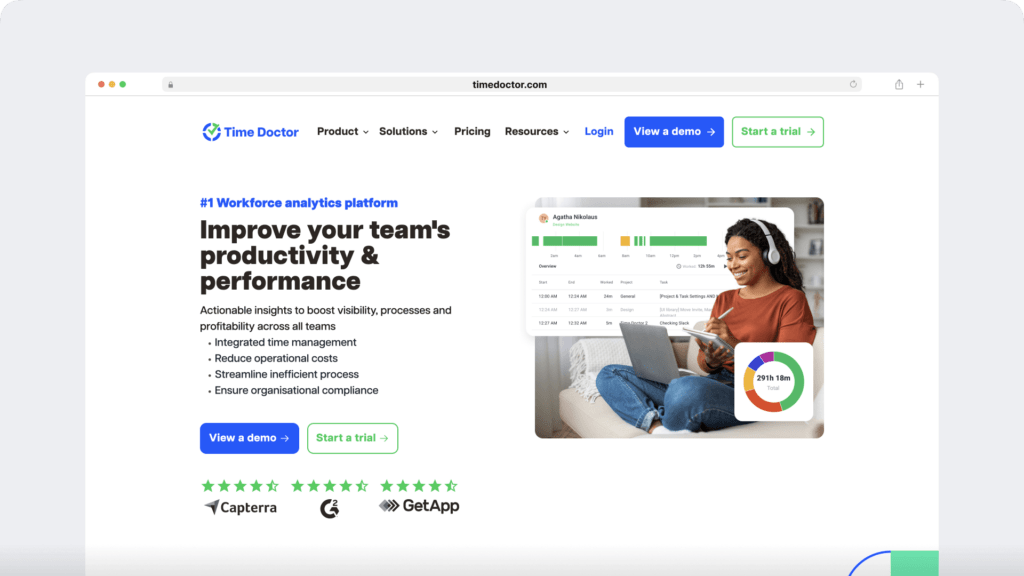Want to outsource your financial activities?
Proper finance management plays a vital role in determining the success and failure of every business.
However, maintaining an in-house team of finance and accounting professionals can be expensive, especially for most startups and SMBs. It’s one of the reasons why most companies turn to financial services outsourcing.
But what is financial services outsourcing, and how can it help your company?
In this article, we’ll cover everything you need to know about outsourcing financial services, including its benefits and drawbacks. We’ll also show you how to choose the right outsourcing service and how you can efficiently manage your outsourced staff.
Table of Contents
- What is financial services outsourcing?
- 3 major benefits of financial services outsourcing
- 2 key drawbacks of financial services outsourcing
- How to choose the right outsourcing provider (step-by-step guide)
- How to manage your outsourced team efficiently
Let’s jump right in!
What is financial services outsourcing?
Financial services outsourcing broadly refers to the outsourcing of several finance and accounting functions.
This usually includes back-office tasks like:
- Financial analysis
- Managing accounts payable and accounts receivable
- Bookkeeping
- Risk management
But wait… what’s outsourcing?
Outsourcing refers to hiring a third-party company to perform tasks or services instead of doing them in-house.
In a nutshell, most companies outsource financial services for several reasons like:
A. Financial processes are usually complex
Processes like accounting and supply chain finance management require tons of expertise and experience. That’s why many companies prefer to outsource them to a dedicated financial institution instead of putting inexperienced in-house staff on the job.
B. Keeping up with the latest technology
Outsourcing services usually have the latest software for performing the finance function, allowing you to benefit from their constantly updated infrastructure.
C. Improved efficiency
By outsourcing complex finance tasks, you can dedicate your time and resources to your core business activities instead.
D. Operational resilience
As you can upscale or downsize your outsourced processes at any point, outsourcing acts as a shield against the operational risk of a volatile market or unforeseen circumstances like COVID-19.
Now that you have a rough idea of why companies outsource their financial activities, let’s take a detailed look at three key benefits that form the basis for all the benefits we discussed above:
3 major benefits of financial services outsourcing
Recently, tons of companies have turned to financial services outsourcing as a cost-effective solution to boost their business growth.
Here are three significant reasons behind this:
1. Cut hiring and infrastructural costs
An in-house finance department can be costly.
From hiring and training costs to management and office rentals, most businesses have to shell out thousands of dollars just to handle their accounting and financial reporting needs!
However, by outsourcing the finance department, you can significantly reduce these costs.
How?
By working with a financial services outsourcing service provider, you save on:
A. Talent acquisition and onboarding costs
Instead of spending tons of time and money on finding the right employees, hiring an outsourced team allows you to get started immediately.
B. Training costs
Financial services outsourcing professionals have years of experience catering to a variety of businesses. This reduces the resources and time you have to spend on training your outsourced accounting services team.
C. Software pricing
To stay competitive, outsourcing solutions regularly update their software. This allows you to benefit from top-of-the-line tools at a fraction of the cost you’d incur if you invested in them yourself.
D. Infrastructural costs and rentals
As your outsourced team does not consist of in-house employees, you don’t need to worry about renting real estate or paying for utilities (electricity, internet connection, etc.). Your outsourcing arrangements take care of all these costs.
To sum up: Outsourcing an accounting service allows you to work with the best financial experts in the financial services industry at a fraction of the cost of maintaining in-house teams!
2. Access to global talent and expertise
When you hire in-house finance teams, you’re usually limited to the talent pools available locally. However, the best fits for your company may not always be the ones from your city or country!
Luckily, this isn’t the case with outsourcing.
Outsourcing your finance tasks allows you to work with the best professionals in the financial services sector from across the world. These teams are experienced at working remotely to provide as much, if not more, value when compared to an in-house team.
What’s more?
Thanks to time zone differences, working with a global talent pool allows you to extend your company’s operational hours. Through effective management and communication, you can take advantage of the timezone disparity to massively boost the efficiency of your finance activities.
3. Increase in-house efficiency
By outsourcing your financial services, you can increase the efficiency of your in-house staff as well.
How?
There are several reasons for this:
A. Offload managerial responsibilities
Outsourcing your financial team allows managers and business owners to focus on the core aspects of your business instead of trying to keep up with accounting and financial statements.
This is especially beneficial if your managers are responsible for other departments and aren’t particularly experienced in financial management.
B. Frees up your in-house employees
As all financial services are taken care of by your outsourced team, your in-house employees can spend more time and effort on other roles towards growing your business.
C. Optimize current expenditure
An excellent accounting outsourcing provider can help you identify cost saving opportunities without compromising on efficiency and quality of work.
2 key drawbacks of financial services outsourcing

Now that you know how outsourcing can help your company, let’s take a look at two significant disadvantages of outsourcing your financial services:
1. Communication can be difficult
As outsourced teams don’t work in the same office as you, maintaining efficient communication can be difficult.
Why?
When it comes to an in-house accounting department, it’s easy to hold meetings or even impromptu discussions. All you need to do is walk up to them and ask them for what you need.
However, this won’t work with an outsourced accounting team!
Depending on whether you choose an onshore or offshore outsourcing provider, you could even be in an entirely different timezone from your finance team.
For example, if you’re in the United States and your outsourced team is in India, they would naturally have different work hours from yours.
Understanding such communication gaps and resolving them is key to functioning effectively.
Use a comprehensive communication platform and ensure you communicate your expectations and needs thoroughly to get the most out of your outsourced finance and accounting firm.
2. Cultural and language barriers
Your outsourced finance team may follow a different work culture and set of norms when compared to your in-house employees. This is especially true for offshore outsourcing services.
In such cases, you need to ensure that your financial services provider follows the same regulatory requirements for processing your financial data or personal information as an in-house team would.
To do this, you could create a guidelines document or conduct an onboarding session with your outsourced team to ensure that everyone is on the same page.
Additionally, take into consideration language barriers that may exist between your in-house team and the outsourced one. Consult your outsourcing provider and try working on a trial project to ensure that these do not impact your work efficiency.
How to choose the right outsourcing provider (step-by-step guide)
While outsourcing your financial services can have a few drawbacks, it’s clear that it still makes sense for most businesses.
However, if you’re interested in outsourcing, you first need to choose the best outsourcing provider for your needs.
But there are hundreds of companies offering financial services outsourcing.
So how do you pick the right outsourcing contract for your business?
Here’s a step by step guide that’ll make this process a piece of cake:
Step 1: Identify your business needs
Before you begin looking at the various financial services available, think about what exactly you need from your outsourcing service.
Take into account several factors, such as:
- Do you only need to outsource specific tasks, such as accounting or financial planning tasks? Or are you looking for a complete business process outsourcing (BPO) solution?
- Would you prefer an onshore, nearshore, or offshore outsourcing company?
- Depending on the data and operations that you’ll share with the outsourced team, what kind of security and privacy measures are required?
List out all your business needs and keep these in mind when you look for the perfect outsourcing service.
Step 2: Estimate your company budget
While it may not be possible to accurately calculate your outsourcing expenditure yet, you need a rough estimate to ensure your business doesn’t risk overspending.
While estimating your budget, think about:
- The exact services you need.
- What your company can afford to spend.
- The value they’d bring to your company.
- What it would cost to hire an in-house team for the same work.
Use these figures as rough guidelines to estimate the approximate range of your outsourcing budget.
Step 3: Narrow down service providers
Now that you know what your company needs and what you can afford, it’s time to search for service providers.
Use the factors given above as parameters to narrow down your choices.
Additionally, consider what benefits each vendor provides – which might not be something you thought of before.
These could include:
- Discounted pricing.
- Security compliance and internal control measures.
- Software and infrastructure used by the outsourcing service, and more.
By the end of this step, you should have a list of around 5-6 potential service providers at most.
Step 4: Look at client reviews and testimonials
It can be difficult to judge how well a service provider will fit your needs before hiring them.
This is where reviews and testimonials come in!
Take due diligence and look at the other clients the outsourcing service provider has worked for in the past and their work quality. Keep an eye out for businesses in similar industries as yours or those with the same financial service/finance industry needs.
Read what other clients have to say about the outsourcing provider’s performance, employees, and quality of work. Use these impressions to narrow down your choices to a maximum of 2-3 financial services outsourcing companies.
Step 5: Use a trial project
For the final step, work on a short project or task with each of the outsourcing providers you’ve selected.
This allows you to judge their performance and how well they suit your business requirements.
Decision-makers should observe factors like:
- Performance and efficiency: How good is the outsourcing team at completing the work they’ve been given?
- Communication and compatibility: How well does the outsourced team work with your in-house employees? Are there any significant communication barriers or gaps that may affect your operations?
- Value: How well does each outsourcing solution fit your particular business needs? Use an objective metric or key performance indicator (KPI) to determine performance.
After analyzing the trial project, you should have a clear picture of the best outsourcing provider for your financial services.
How to manage your outsourced team efficiently

To get the best results from your outsourced team, you need to manage them the right way.
Here are the key considerations to keep in mind for this as well as the best tools to help you out:
1. Communication
Communication is one of the most important factors when it comes to managing your outsourced financial service team’s performance.
To make the most of your outsourced finance team, use a comprehensive messaging platform, like Slack, that supports features like:
- Instant messaging.
- Channels and threads.
- Multi-user access levels.
- Integrations with other popular software.
While instant messaging is great for quick questions or real-time responses, it isn’t a perfect substitute for a face-to-face conversation with your outsourced team members. After all, text messages aren’t also ideal when it comes to detailed discussions or lengthy explanations.
For these situations, ensure that you have a powerful video-conferencing solution at hand Popular options include Zoom, Microsoft Teams, and Google Meet.
2. Project management
To keep track of your outsourced financial tasks, you need a robust project management solution with a user-friendly interface.
Why?
A project management tool allows you to stay updated on task progress, assign projects easily, and manage all your outsourced financial tasks in one place.
You can even set goals, milestones, and also ensure smooth task collaboration between your in-house and outsourced teams. This way, everyone will be on the same page regarding all your financial tasks.
Popular project management tools you could choose from include software like Trello and Asana.
3. Productivity management
While a project management tool can help you track your progress on tasks, it can’t tell you how productive your outsourced financial team is.
For this, you need a dedicated productivity management software like Time Doctor.
What’s Time Doctor?

Time Doctor is an all-in-one productivity management and time tracking system that helps you optimize your outsourced and in-house teams’ productivity. Its powerful features are used by a huge firm like Ericsson as well as small businesses, such as Thrive Market, to boost overall efficiency.
How can Time Doctor help manage your outsourced team?
Let’s take a look:
- Simple time tracking: The simple time tracker helps you track time as well as web and app activity, so you know exactly how your outsourced team spends their work hours.
- Productivity ratings: Assign each website and app a productivity rating to identify barriers to productivity.
- Screenshot monitoring: Helps ensure that your outsourced team doesn’t violate company policies or regulatory requirements in the financial industry.
- Powerful reporting: From accurate timesheets to visual productivity reports, Time Doctor features 7 detailed reports to help you analyze productivity. This way, you’ll know if your service provider is only billing you for the time they spend on your financial tasks.
- Payroll management: Easily pay your outsourced staff on an hourly or fixed basis.
Thought that was it?
These are just some of Time Doctor’s powerful features.
Click here to see what else is in store for you.
Final thoughts
While outsourcing your financial services can seem daunting at first, it doesn’t have to be hard.
Just follow the steps and tips in this article, and you’ll be all set to outsource your finance department. Once you have the right service provider and the right set of tools, you’ll enjoy all the benefits financial services outsourcing can offer you before you even know it!
Is there anything else you’d like to know about financial services outsourcing?
Let us know in the comments below.

Andy is a technology & marketing leader who has delivered award-winning and world-first experiences.


